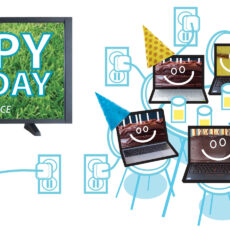Where do I start in breaking their addiction?
There are ways to break kids reliance on technology, but it is not easy. Once reliant on their devices to occupy their time, they will resist your efforts to reduce their time online. We outline below some of the ways in which you can reduce this reliance.
If possible, begin by setting up healthy habits for screen time while they’re young. Resist the urge to hand them an iPhone or tablet when you’re busy, to keep them engaged and quiet. Sure, you will have peace for a bit, but you’ll pay a hefty price once they are older. By teaching them young, they will be more likely to transfer good habits into their adulthood. They will then be able to navigate the digital world in a more mindful and productive way.
So, in trying to wean your child off their online obsession, consider the following factors:
- Don’t get them to go cold turkey! This will make the transition seem much more difficult and more like a punishment, rather than in their best interests. Work on slowly reducing their screen time, rather than eliminating it.
- If there were no boundaries before — set some. Such as a daily screen-time limit and ‘no screen-time zones’ (like during family time or before bed). It’s also vital to have no screen time in bedrooms. This does depend on the age of the child, but is very important for young children.
- Make a hierarchy of priorities. Set guidelines for what must be done before they can have screen time. Tasks such as homework, cleaning, preparing for school, and family time must all occur first.
- Make a hierarchy of screen time. Allow communal, interactive screen time before individual screen time, and educational content before simple games.
- Start by changing the content, rather than usage. Replace pure entertainment or mindless games with apps or programs with some educational grounding. This is so important! They often have an incredibly powerful computer in their hands, but never do more than play games or watch YouTube.
- Replace screen time with other enjoyable activities. Drawing, reading, playing games, outdoor activities, or even some extra dessert. If possible, time with family is extra special.
Slowly implementing some of these ideas will reduce your child’s screen time without them even noticing.
There are ways to break kids reliance on technology - Adolescents

But it’s also important to note the distinction in approach between adolescents and children:
Children need strict boundaries, and you can make them.
Adolescents need to feel some autonomy and control, so compromise is best. Work on negotiating the terms of their screen time, rather than dictating them.
It has been announced that children as young as 12-years old will be eligible for gaming addiction treatment on the NHS. A report by Anne Longfield, the Children’s Commissioner, wrote an article called Life in Likes. In it she stated that children become increasingly anxious about their online image as they head into their teens. Longfield said social media is exposing children to “significant risks emotionally”. She added there was a particular “cliff edge” as they transition from junior into secondary school. She warned that social media firms must take more responsibility for helping children through the challenges of life online. Without help, children are at risk of “growing up chasing likes”.
While younger children gorge on YouTube, games and some social media, teens and adolescents are heavily into social media.
New territory for parents
As parents we’re in the position of having no rule book or compass to guide us in this new world. We cannot even turn to our own parents for advice. Most of us grew up in an age of no mobile phones. Instead we had books, magazines and long chats on the home phone. As adults we’ve stumbled into this unregulated digital space blindly. We know we should embrace it, and get to grips with digital. Everything we know, from work to shopping to socialising, is changing!
Teens routinely use apps such as Snapchat and Instagram to communicate. Both can be damaging to their self-esteem and happiness. This is a time to setting limits and begin discussions to encourage critical thinking. Teens are savvy and once you explain to them that they are a consumer pawn for internet giants to make money out of advertising and data, and that many of the influencers they follow are paid to promote products, they start to wise up.

Are you setting a good example?
Among all these changes, make sure you keep your own best interests in mind, too…
How can we tell our children to get off social media, when we ourselves are regularly updating our feeds, when social media has become a key tool for work, and for many a way to make money? Utilise screen time hours for when you most need your own time to get things done.
This will benefit both you and your children, because the more you can spend quality time together, the less they’ll be preoccupied with picking up their phones or tablets.
Good luck — and if you feel that you may be too technology-dependant as well, try some of these guidelines for yourself!
It’s also very important to be aware of technoference – when technology gets between you and your child. If children see you constantly on technology it will be hard to impose restrictions on them.




